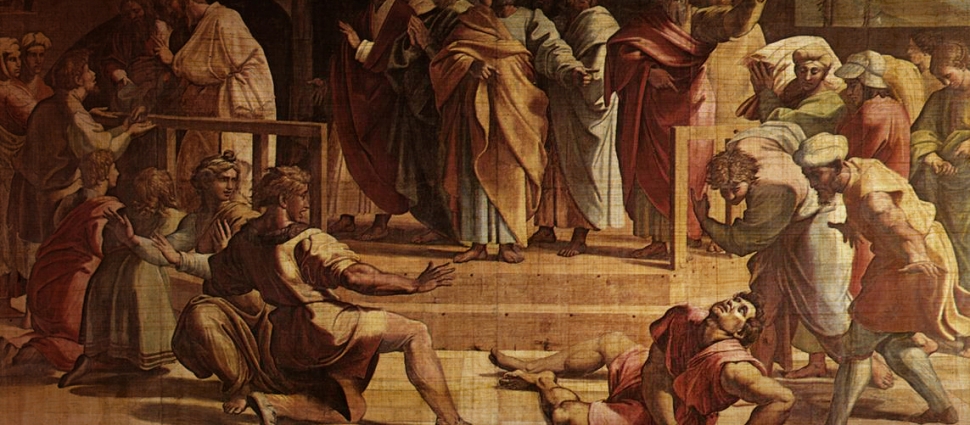Who Drops Dead in the New Testament?

You learn a lot about what matters to someone by what drives them to extremes. Think of a person camping out, lining up in the rain, to get concert tickets. Think of a couple paying physical and emotional costs to adopt a special needs child from overseas.
The same is true for God. In the New Testament, God does not normally strike people down. In fact, Jesus resists his disciples when they want this to happen (Luke 9:54). This kind of striking-down is rare in the New Testament; we only have two substantial cases of it occuring. The first is in Acts 5 (the story of Ananias and Sapphira) and the second is in 1 Corinthians 11 (the Lord’s Supper). These are the two well-documented moments of extreme judgment in the New Testament.
What do we learn from these incidents about what matters to God? The results may surprise you. Both cases show how God desires unity and equality in the body of Christ, and how he hates it when people destroy this by positioning themselves higher than others.
In the story of Ananias and Sapphira, we know nothing of the motives of this couple. Why did they hold money back from the sale of their property? The text doesn’t say. So we shouldn’t make this the point. What the text does say, of first importance, is that something extraordinary was happening at this moment of history, something of the magnitude of the Exodus or the giving of the Torah. The Spirit was being poured out on all God’s people, from the least to the greatest, in a way that had never happened before (Acts 2:17-18).
At this moment, the act of giving the Spirit was a sign pointing towards equality of the body. In the Joel prophesy, which Peter quotes, there is now equality between young and old, male and female. Further, we see in Cornelius’s conversion how the Spirit was poured out the same way on Gentiles as he was on Jews, at Pentecost. This showed that the Gentiles were equal members in the body of Christ. Then at the end of Acts 2, the believers had all things in common. People were selling goods so that everyone might have a share.
This same extraordinary unifying behavior was still happening in Acts 4, and what we should see from this is that the Spirit was being paraded as the one who brings unity to God’s people. Ancients dreamed of societies with such harmony. But while many wanted to engineer harmony, here in the Acts account it was happening miraculously as the Spirit moved people’s hearts.
Enter Ananias and Sapphira, who sell a field, but keep some money back. Why was this such an issue?
They were not being led by the Spirit. Instead they were seeking to engineer something. And what would have happened if people found out that they were keeping money back? It would have corrupted the sign of what the Spirit was doing, bringing the miraculous harmony into question. So a line was drawn, in order that the message would not be diluted.
What about the Lord’s Supper? This is also a debated passage, but all the best attempts to understanding it have had context firmly in mind. In Mediterranean culture, meals were used to honor certain people over others. People would invite some to their banquet whom they didn’t like, so they might serve as foils for those they did like! They would give these “lesser people” lower spots, and give them stingier proportions, so that it might communicate how much they loved those who were seated nearer and given more. This is the context for issues surrounding the Lord’s Supper in Corinth, as indicated in 1 Corinthians 11:20-22. So when it came to people not “discerning the body” (11:29), this most logically meant they did not recognizing the body of Christ, the Church. “That is why many of you are weak and ill, and some have died” (11:30).
There are therefore some remarkable similarities between the two passages. In both an important sign and symbol was being set up for what the Lord was doing – establishing unity and equality in the Church. And in both cases this was being corrupted with catastrophic consequences.
What then does this mean for us? It tells us that God takes unity and equality in the Church very seriously. How serious is it when someone uses the Church as a place to make a name for themselves? Serious! How serious is it when some people are lifted up, and others are put down? Serious! How serious is it when people do things that create dissention and division between Christians? Serious!
We might have expected people to be struck down for doctrinal error. Not so. May it be, therefore, that we take seriously in our midst what the Lord considers the most serious!
Bruce Lowe (PhD) is Associate Professor of New Testament at Reformed Theological Seminary in Atlanta.
Related Links
"Unity in Multi-Categorical Diversity in the Church" by Nick Batzig
Mortification of Spin, "God's Transcendence and Poverty Alleviation"
PCRT '85, The Church: God's New Society [ Audio Disc | MP3 Disc | Download ]
Beyond Authority and Submission: Women and Men in Marriage, Church, and Society by Rachel Green Miller
The Church: Glorious Body, Radiant Bride by Mark G. Johnson
A Well-Ordered Church by William Boekestein and Daniel Hyde




